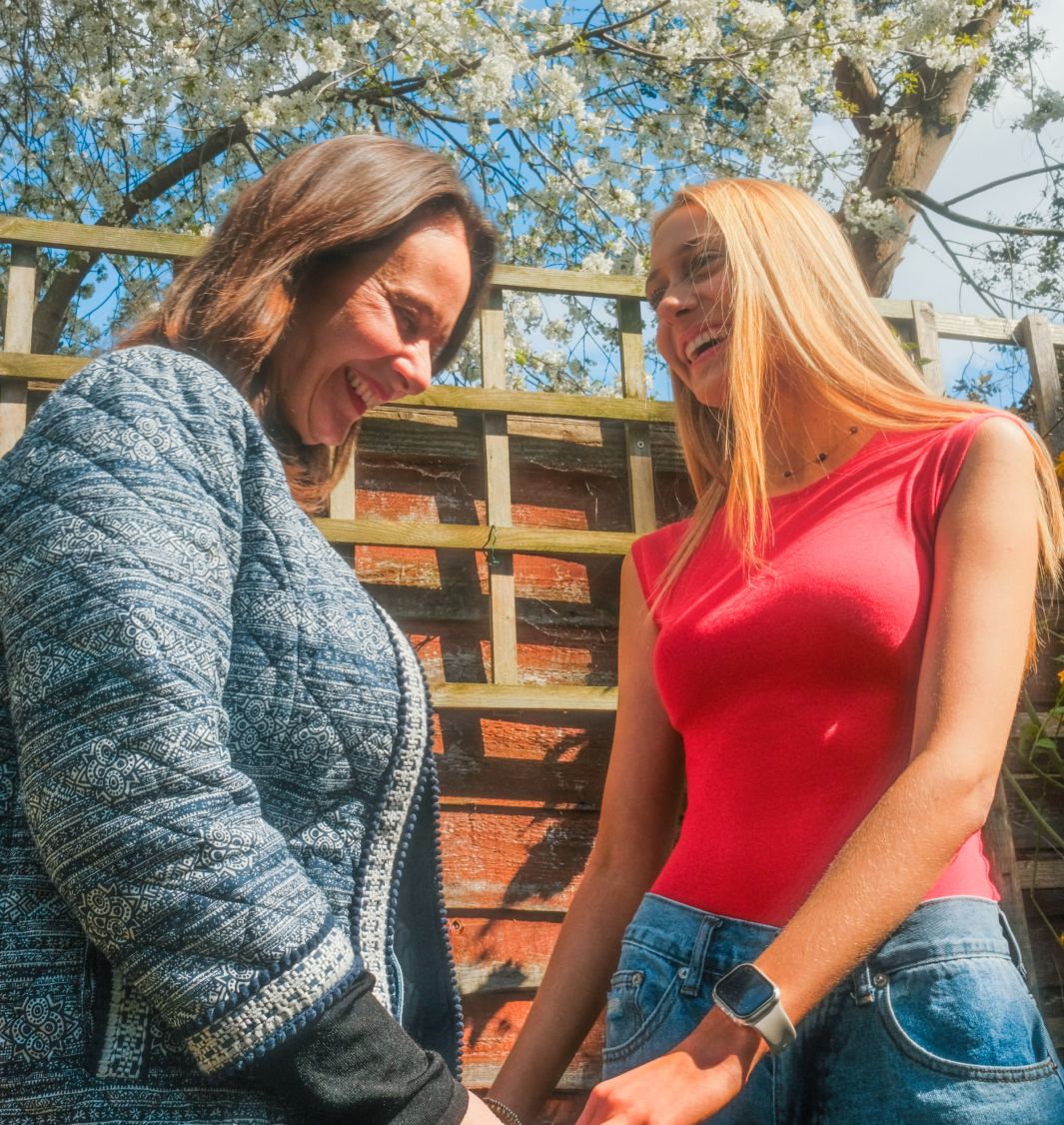
How puberty and menopause connect
The similarities between menarche and menopause

Quick summary
- Menarche (first periods) and menopause share key experiences
- Both life stages can bring emotional ups and downs, hormonal changes, irregular cycles, and body image shifts
- Understanding these connections can be interesting if you have a teen and are going through menopause yourself

One big milestone for female teens during puberty is menarche – the start of menstruation, or more simply put: periods.
While the menarche signals the beginning of a teen's reproductive years, it may surprise you to learn that it shared some very similar traits to menopause – the end of menstruation.
We hope that by signposting the many similarities, it can help connect you with your teen if you are experiencing menopause.
Or, if you are not experiencing menopause, hopefully this will help you learn something new about the common experiences shared in both phases, and offer some ideas on how to support someone going through either one.
1️⃣ Hormonal shifts
Both menarche and menopause involve significant hormonal changes, albeit at opposite ends of the reproductive timeline.
During menarche, the body starts producing higher levels of regulatory hormones like oestrogen and progesterone.
In contrast, menopause is marked by a decline in these hormones as the body transitions out of its reproductive phase.
What are the parallels?
- Emotional fluctuations: the change in hormones can cause emotional and psychological ups and downs as the body adjusts
- Physical symptoms: hormonal changes can lead to physical symptoms like bloating and changes in energy levels
2️⃣ Unpredictable cycles
The early stages of menstruation and the approach of menopause are both often associated with irregular cycles.
How to support a teen dealing with irregular periods?
- Normalising irregularity: you might want to reassure your teen that it’s normal for their menstrual cycle to take a couple of years to settle into a regular pattern as their body gets used to the change
- Know when something isn't normal for them: if your teen has regular cycles and then they become irregular, or if they are irregular beyond two years from start of menstruation it’s good to seek medical advice from a doctor
- Tracking cycles: encourage your teen to use a period tracker (such as the one available on luna) – this can help identify any forming patterns and manage symptoms more effectively; until periods are regular it’s best for them always to keep some period products in a kit
3️⃣ Body image concerns
Both menarche and menopause bring about noticeable changes in the body, impacting how confident someone feels in their appearance.
During menarche, a teen’s body is developing new characteristics like breasts and body hair, as well as skin and weight changes.
Menopause is also often accompanied by body changes – like weight gain, skin texture changes, and hair thinning.
How can body image be improved?
- Open conversations: anyone going through such rapid physical changes may struggle with self-consciousness – have empathetic discussions which normalise all these changes can be very helpful; it doesn't have to be super explicit, particularly in the case of teens who might find this awkward, but more about being empathetic and kind if a teen approaches you with body image concerns
- Positive body image: we should encourage anyone struggling with this to appreciate their body for what it can do – rather than just how it looks; this can foster a healthier self-image
4️⃣ Challenges with sleep
The hormonal fluctuations mentioned earlier can also affect sleep quality, leading to restless nights or difficulties in falling asleep.
What can help create good sleep hygiene?
- Establish a routine: developing good bedtime habits are key – such as a consistent sleep routine, which can help regulate their sleep patterns; this routine might include winding down with a book, practising relaxation techniques, or limiting screen time before bed
- Address anxiety: if anxiety is contributing to sleep problems, try having an open conversation with loved ones about any worries or writing them down before bed
5️⃣ Emotional ups and downs
The emotional impact of starting periods can be intense, mirroring the emotional challenges many adults face during menopause.
Both life stages involve big transitions that can lead to feelings of uncertainty, anxiety, and even vulnerability.
What are some ways to support emotional wellbeing?
- Empathy and understanding: validate their feelings – it won't always be easy at times, but even if it seems like it isn't a big deal try to remind them that it's okay to feel the way they do; if you need, luna's got a whole guide on helping teens with their mood swings. The same goes for yourself if you are experiencing this – treat yourself with the same kindness you would treat others; you deserve it
- Encourage open dialogue: whether it’s frustration over bodily changes or anxiety about fitting in, talking about this can be really validating – especially if you're both sharing the same experience
- Get support: whilst mood swings are normal, if you or your teen is often or always down or anxious it’s important to seek professional help early from a GP or free mental health services
6️⃣ Use of hormones
Hormonal treatments have a purpose in regulating cycles, resolving mood imbalances, and managing physical symptoms in both menarche and menopause.
What are the medical interventions available?
- For teens in menarche: in cases where a teen’s menstrual cycle is especially irregular or causing significant discomfort, healthcare providers may suggest hormonal therapies like birth control pills – these can help regulate periods, reduce pain, and manage other symptoms that can cause distress such as acne
- For adults in menopause: hormone replacement therapy (HRT) is commonly used to manage menopausal symptoms such as hot flashes, mood swings, and vaginal dryness by supplementing the body’s decreasing hormone levels
So what can you talk away from this?
Hopefully understanding the parallels between menarche and menopause has offered some valuable insights into both experiences, particularly if you and your teen are going through this together.
By recognising these connections, you can guide your teen through this transition with empathy, open communication, and reassurance, and help them through this important life stage with a greater sense of ease.
How we created this article:
luna's team of experts comprises GPs, Dermatologists, Safeguarding Leads and Junior Doctors as well as Medical Students with specialised interests in paediatric care, mental health and gynaecology. All articles are created by experts, and reviewed by a member of luna's senior review team.
Sources:
My Girls Gynae "Puberty and menopause - 2 sides of the same coin"
https://mygirlsgynae.com/puberty-and-menopause-similarities/Meir Steiner, Edward Dunn, Leslie Born "Hormones and mood: from menarche to menopause and beyond"
https://www.sciencedirect.com/science/article/abs/pii/S0165032702004329NHS "Starting your periods"
https://www.nhs.uk/conditions/periods/starting-periods/NIH "What are the common treatments for menstrual irregularities?" | Accessed 11.09.24
https://www.nichd.nih.gov/health/topics/menstruation/conditioninfo/treatmentsNHS "Menopause treatment"
https://www.nhs.uk/conditions/menopause/treatment/Sylvia Frey, Silvia Balu, Sarah Greusing, Nicolas Rothen and Christian Cajochen "Consequences of the timing of menarche on female adolescent sleep phase preference"
https://www.ncbi.nlm.nih.gov/pmc/articles/PMC2668189/NIH "Sleep problems and menopause: what can I do?"
https://www.nia.nih.gov/health/menopause/sleep-problems-and-menopause-what-can-i-doNHS Inform "Menopause"
https://www.nhsinform.scot/healthy-living/womens-health/later-years-around-50-years-and-over/menopause-and-post-menopause-health/menopause/NHS "Periods in adolescent girls"
https://mft.nhs.uk/app/uploads/sites/4/2022/05/TIAG-15-22-Periods-in-Adolescent-Girls-Final-Leaflet-NOV-2021.pdfGreta Riboli, Rosita Borlimi, Gabriele Caselli "A qualitative approach – delineates changes on pubertal body image after menarche"
https://www.tandfonline.com/doi/full/10.1080/02673843.2022.2032219Coralie Vincent, Alexandra M Bodnaruc, Denis Prud’homme, Viviane Olson, Isabelle Giroux "Associations between menopause and body image"
https://www.ncbi.nlm.nih.gov/pmc/articles/PMC10666711/Mental Health Foundation "Body image in later life"
https://www.mentalhealth.org.uk/our-work/research/body-image-how-we-think-and-feel-about-our-bodies/body-image-later-lifeFind out about trends when your teen does
Sign up to our parent newsletter for emails on the latest teen trends, insights into our luna community and to keep up to date
By signing up, you are agreeing that we can use your email address to market to you. You can unsubscribe from marketing emails at any time by using the link in our emails. For more information, please review our privacy statement.